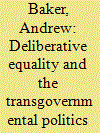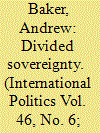| Srl | Item |
| 1 |
ID:
088079


|
|
|
|
|
| Publication |
2009.
|
| Summary/Abstract |
Revisiting the concept of transgovernmentalism, originally developed by Robert Keohane and Joseph Nye, can shed considerable light on the nature of interstate cooperation in contemporary global financial governance. Transgovernmentalism highlights how certain technocratic policy communities, composed of finance ministries, central banks, and regulators, dominate the global financial architecture. It also provides insights into the political and social basis of these actors' interactions and deliberations. Most importantly, renovating the concept of transgovernmentalism brings the participatory deficits in the current global financial architecture into sharp focus and points us in the direction of a workable reform agenda that would expand inclusion and participation. This article advocates basing future reform on efforts to achieve a closer realization of the principle of "deliberative equality." Unfortunately, "transgovernmentalism" is incompatible with deliberative equality, meaning that it is precisely the transgovernmental characteristics of the current global financial architecture that have to be challenged and overturned if we are to arrive at anything approximating deliberative equality.
|
|
|
|
|
|
|
|
|
|
|
|
|
|
|
|
| 2 |
ID:
091435


|
|
|
|
|
| Publication |
2009.
|
| Summary/Abstract |
Great Britain is regarded as a classic example of the Weberian state, and thus as a model of a developed state that might be contrasted with developing states. However, this view conceals the formative role of empire in the evolution of the British state. Rather than take the distinction between a 'metropolis' and a 'periphery' as given, this article explores the mutual constitution of state and empire. What it finds is that the political identity of the British state changed dramatically during the first half of the twentieth century as British intellectuals and policy-makers attempted to develop a new political community, primarily through the vehicle of the Commonwealth. The British state of the interwar years decentralised its decision making and embedded itself firmly in new multilateral networks. A rationalised, centralised British state emerged after the Second World War and only then within a context of multiple (principally Atlantic and European) political identities. The modern British state is as much a post-colonial invention as are states of the 'developing' world.
|
|
|
|
|
|
|
|
|
|
|
|
|
|
|
|
| 3 |
ID:
096247


|
|
|
|
|
| Publication |
2010.
|
| Summary/Abstract |
A growing number of respected commentators now argue that regulatory capture of public agencies and public policy by leading banks was one of the main causal factors behind the financial crisis of 2007-2009, resulting in a permissive regulatory environment. This regulatory environment placed a faith in banks own internal risk models, contributed to pro-cyclical behaviour and turned a blind eye to excessive risk taking. The article argues that a form of 'multi-level regulatory capture' characterized the global financial architecture prior to the crisis. Simultaneously, regulatory capture fed off, but also nourished the financial boom, in a fashion that mirrored the life cycle of the boom itself. Minimizing future financial booms and crises will require continuous, conscious and explicit efforts to restrain financial regulatory capture now and into the future. The article assesses the extent to which this has been achieved in current global financial governance reform efforts and highlights some of the persistent difficulties that will continue to hamper efforts to restrain regulatory capture. The evidence concerning the extent to which regulatory capture is being effectively restrained is somewhat mixed, and where it is happening it is largely unintentional and accidental. Recent reforms have overlooked the political causes of the crisis and have failed to focus explicitly or systematically on regulatory capture.
|
|
|
|
|
|
|
|
|
|
|
|
|
|
|
|